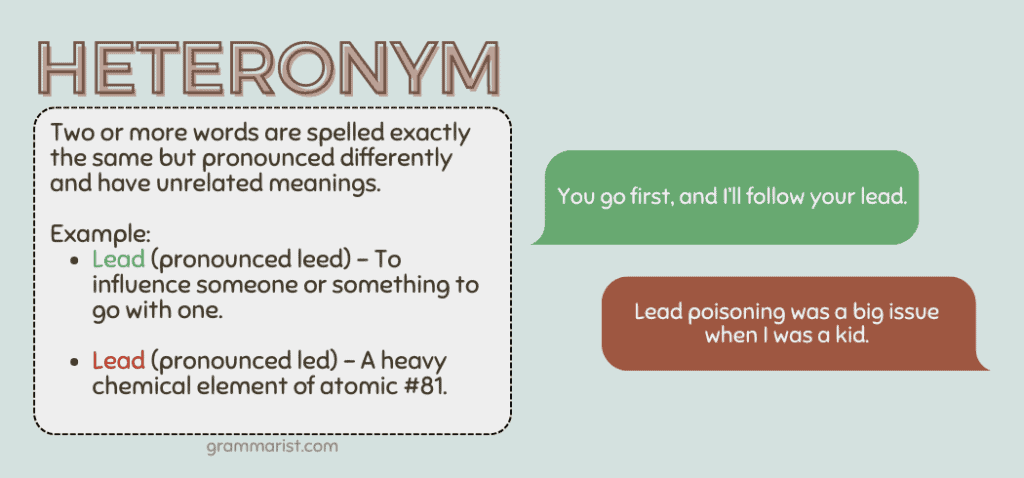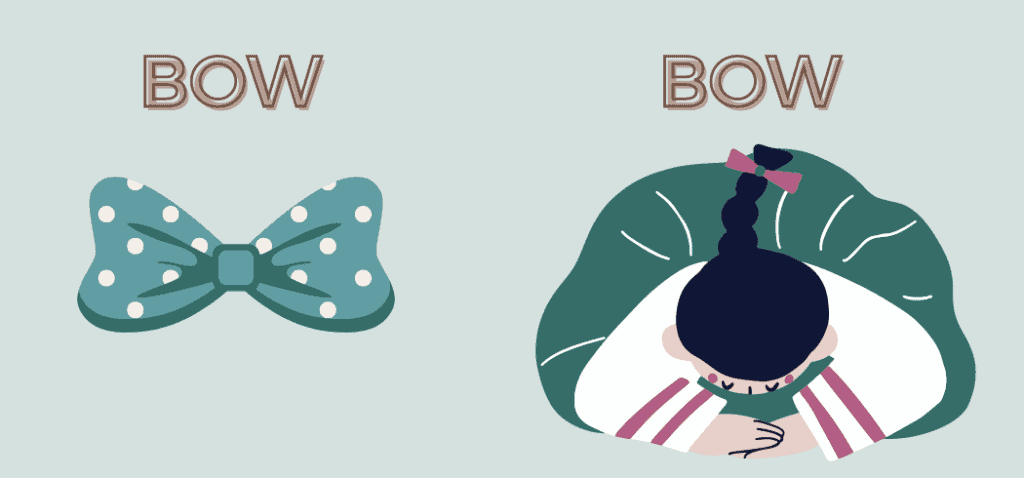There are many different words in the English language that create confusion due to their similar spellings and definition, but one of the most frustrating are heteronyms. Heteronyms are words that look exactly the same but are pronounced and defined differently.
It can be difficult to learn how to spell different words that look the same. The way the pronunciations and definitions differ can be confusing even to native English speakers when attempting to learn vocabulary correctly.
Let’s look at how to define heteronyms and understand how to recognize and use them in your writing.
What Is a Heteronym?

Heteronyms are two or more words spelled exactly the same but pronounced differently and have unrelated meanings.
For example, in the following sentences, the words lead (pronounced leed) and lead (pronounced led) highlight how heteronyms work:
- After half-time, the team will be going into the final round with a 5-4 lead over their opponents.
- The idea that pencils use lead comes from the ancient Roman stylus; in fact, pencils have only used graphite.
In the above sentences, lead means bringing something along or escorting them and the metallic element, respectively.
The pattern of one of the words being a noun and the other a verb is consistent with most heteronyms but is not required.
Heteronyms exist because of our ever-changing English language, and these words with the same spelling and different pronunciations and meanings are a challenge for those who wish to learn to speak English.
How Heteronyms Compare to Homographs, Homophones, and Homonyms
Homographs are words that have the exact same spelling but have a different meaning and/or a different pronunciation. A homograph is also a heterograph ONLY when the words have different meanings AND pronunciations.
Homophones are words with the same pronunciation but different meanings and/or spellings. Homonyms are words spelled AND pronounced the same but have different meanings.
Heteronym Origins
The word heteronym is derived from the Greek hetero-, which means different, and -onym, which means name. Its use is from the late 19th century.
List of Heteronyms Used in Sentences

Although this is not a complete list, this is a comprehensive one of some of the most widely used heteronyms. Take a look at each word and how it can be used in context.
Alternate
- I need an alternate option for your class schedule.
- It’s really annoying when my boss alternates schedules from one week to the next.
Attribute
- Those attributes are exactly the ones an employer will be looking for, so be sure to build those skills.
- I attribute my success to my many colleagues helping me through the years.
August
- My oldest child was born in August 2010.
- Her august lineage could be traced back to expansive landowners during the late 14th century.
Bass
- The bass fishing tournament was held at the local lake every year.
- By the time she was 15, she was playing bass for a prestigious symphonic group.
Bow
- When I was a child, my mother loved to tie back my long hair with colorful bows.
- When the audience claps, take a bow to acknowledge their appreciation of your work.
Buffet
- I love the all-night food buffets in Las Vegas; they are perfect after a long night of partying.
- Birds will often buffet their wings at one another, especially during the height of the mating season when they are trying to garner attention from a potential mate.
Close
- Please close the door behind you to avoid losing any of the heat.
- She came in a close second during the time trials, but it was enough to compete at the state competition.
Content
- She was content with her grades since she knew she had put her best effort into them.
- The content of the books was supposed to follow along with the curriculum, but there were too many discrepancies, so she made up her own text.
Contract
- Please sign the contract so we know you are interested in a place with our team next season.
- After hearing the news of the move, I watched her lips contract as a sign of her displeasure.
Desert
- The desert is unbearably hot during the day and uncomfortably cold at night.
- Do not desert your friends when they need you.
Minute
- Every minute the lovers spent apart felt like an hour.
- She found minute chiggers clinging to the plant’s leaves; they were almost too small to see.
Present
- She offered him a week-long marine biology camp for his birthday present this year.
- We would like to present this award to you in recognition of all you have done for this community.
Produce
- I need you to pick up some fresh produce from the market on the way home for the stir-fry I’m making for dinner.
- Can you produce the data you wrote this report on, or did you make it up?
Read
- I need you to read the first three chapters before next Monday.
- Have you read that book series yet?
Record
- For the record, I’m not the person who put sand in everyone’s shoes as a practical joke; I just laughed about it.
- I need you to record the state track meet, so those who couldn’t attend can watch the results.
Refuse
- I refuse to bow to the masses and accept what I know is wrong as right.
- The greenhouse’s organic refuse pile was located behind the school and after the expansion needed to be reloaded due to the smell of rotting materials.
Row
- Please stand in the second row, in order of your last name.
- A huge row after the football game Friday night resulted in three student suspensions.
Separate
- The movie truly is a separate storyline compared to the books; I wish so much artistic license hadn’t been taken so the original story could come to life as I visualized it.
- Please separate the groceries that need to be placed in the refrigerator from the canned goods so I can more efficiently put them away.
Sewer
- She was an excellent sewer and had a side business catering to high-end clothing alterations and repairs.
- The smell from the city sewer was unbearable; it took the entire neighborhood to complain before they sent somebody out to take care of the problem.
Tear
- One solitary tear fell from her eye when she heard the bad news; she brushed it away before responding to the change in plans.
- I’m sorry I can’t return your dress to you yet; there is a tear almost six inches long in the hem that I am having repaired.
Windy
- It was such a windy day that I gave up on doing my hair and just wore a hat.
- A windy road led to the house, making it even darker and more mysterious.
Wound
- He suffered a catastrophic wound in the war.
- My grandfather wound his watch every night.
Let’s Review
When two or more words have the same spelling but different pronunciations and meanings, they are called heteronyms.
Usually, their meaning can be determined based on the content of the sentence they are found within, so if you find yourself unsure, look for contextual clues for their definition.